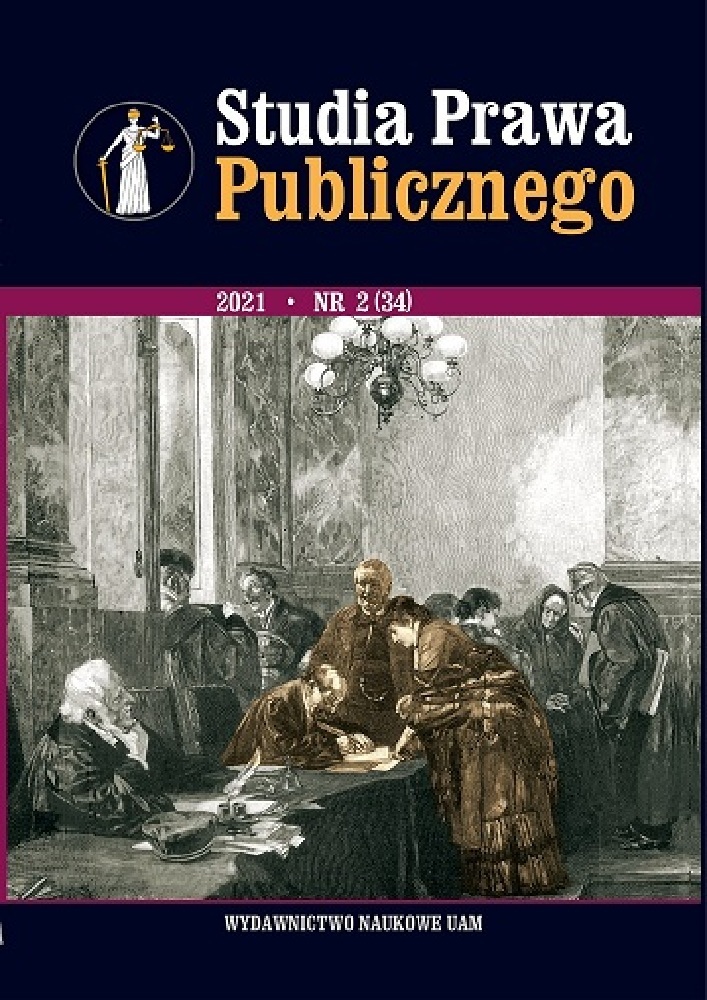Abstrakt
The article presents the case of Dr. Aleck Bourne, which the author proposes to include in the catalog of borderline cases constituting the basis for in-depth discussions on ethical and legal aspects of human life with regard to the development of biology and medicine. The starting point is the presentation of the worldwide models for regulating the practice of abortion as well as the Polish regulation, together with a discussion on the role of the Constitutional Tribunal in shaping current legal provisions. The author notes that the interpretation of the right to life adopted by the Tribunal encourages the repeal of the indication model and the introduction of a complete ban on abortion, which will have significant consequences for ordinary legislation. Apart from describing the facts in the Bourne case, the strategy adopted by the defense and the sentence itself, the possible further areas of considerations regarding the limits of permissibility of termination of pregnancy have been signaled. Then, the conclusions resulting from legal analysis of the case were transferred to the exegesis of the constitutional principles of the right to life and the right to healthcare. Their constitutional form, interpretation resulting from the rulings of the Constitutional Tribunal and the ordinary legislation have been presented. The author indicates the main terminological deficiencies identified in this respect: the lack of any definition of the beginning of a human being, the existence of two separate criteria for determining death, which could lead to different results and the lack of an unambiguous definition of disease adopted by the legislator. Based on the concepts presented in the case, the right to healthcare has been defined as a legal right resulting from the right to life. The final thesis is that there are no grounds for hierarchizing these rights, as they are intertwined in content and function.
Bibliografia
Banaszak B., Komentarz do art. 38 Konstytucji RP, Legalis/el.
Bołoz W., Bioetyka i prawa człowieka, Warszawa 2007.
Boorse C., On Distinction Between Disease and Illness, „Philosophy and Public Affairs” 1975, no. 5.
Bosek L., Gwarancje godności ludzkiej i ich wpływ na polskie prawo cywilne, Warszawa 2012.
Bosek L., Komentarz do art. 68, w: Konstytucja RP, t. 1: Komentarz do art. 1–86, pod red. M. Safjana, L. Boska, Legalis/el.
Breczko A., Podmiotowość prawna człowieka w warunkach postępu biotechnomedycznego, Białystok 2011.
Brookes B., Roth P., Rex v. Bourne and the Medicalization of Abortion, w: Legal Medicine in History, pod red. M. Clarka, C. Crawford, Cambridge 1994.
Cawthon E., Medicine on Trial: A Handbook with Cases, Laws, and Documents, Santa Barbara 2004.
Chyrowicz B., Bioetyka. Anatomia sporu, Kraków 2015.
Costa de C., The King versus Aleck Bourne, „The Medical Journal of Australia” 2009, no. 191(4).
Dworkin R., Taking Rights Seriously, London 1978.
Fijałkowska B., Teorie zdrowia i choroby, w: Bioetyka w zawodzie lekarza, pod red. W. Chańskiej, J. Hartmana, Warszawa 2010.
Grabowski R., Prawo do ochrony życia w polskim prawie konstytucyjnym, Rzeszów 2006.
Haberko J., Cywilnoprawna ochrona dziecka poczętego a stosowanie procedur medycznych, Warszawa 2010.
Hadley J., Abortion: Between Freedom and Necessity, Philadelphia 1997.
Jan Paweł II, Encyklika Evangelium Vitae, http://www.opoka.org.pl/biblioteka/W/WP/jan_pawel_ii/encykliki/evangelium_1.html.
Jaspers K., Philosophy, t. 2, Chicago–London 1969–1970.
Kania A.M., Z problematyki granic ochrony życia ludzkiego, „Wrocławskie Studia Erazmiańskie. Zeszyty Studenckie” 2009, nr 3.
Nawrot O., Nienarodzony na ławie oskarżonych, Toruń 2007.
Paprzycki L., Granice prawnokarnej ochrony życia i zdrowia człowieka na tle uchwały Sądu Najwyższego z 26 października 2006 r. (I KZP 18/06), „Prawo i Medycyna” 2007, nr 3.
Pietrzykowski T., Etyczne problemy prawa, Warszawa 2011.
Przyłuska-Fiszer A., Etyka i przerywanie ciąży, w: Bioetyka, pod red. J. Różyńskiej, W. Chańskiej, Warszawa 2013.
Rex v. Bourne (1939) 1 KB 687, https://www.law.utoronto.ca/utfl_file/count/documents/reprohealth/united_kingdom_1938_bourne.pdf (dostęp: 4 V 2021).
Singer P., Wyzwolenie zwierząt, Warszawa 2004.
Sroka T., Komentarz do art. 38, w: Konstytucja RP, t. 1: Komentarz do art. 1–86, pod red. M. Safjana, L. Boska, Legalis/el.
Stelmach J., Przyczyny sporów bioetycznych, w: Paradoksy bioetyki prawniczej, pod red. J. Stelmacha, B. Brożka, M. Soniewickiej, W. Załuskiego, Warszawa 2010.
Szczucki K., Zagrożenie dla życia lub zdrowia kobiety jako przesłanki dopuszczające przerwanie ciąży. Analiza stanu prawnego, w: Lege Artis – problemy prawa medycznego, pod red. J. Haberko, R. Kocyłowskiego, B. Pawelczyka, Poznań 2008.
Thorwald J., Ginekolodzy, Warszawa 2016.
Zoll A., Problemy służby zdrowia w świetle doświadczeń RPO, „Prawo i Medycyna” 2000, nr 8.
Licencja
Prawa autorskie (c) 2021 Piotr Szudejko

Utwór dostępny jest na licencji Creative Commons Uznanie autorstwa – Użycie niekomercyjne – Bez utworów zależnych 4.0 Międzynarodowe.

